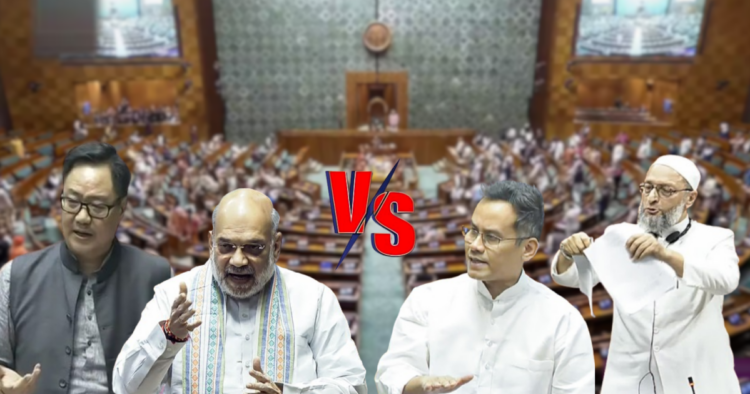- Waqf Bill passed in Lok Sabha, now moves to Rajya Sabha where NDA holds a majority.
- INDI Alliance lacks numbers to block the bill, even with BJD’s support.
- Opposition calls it anti-Muslim, while the government claims transparency; legal battle ahead.
After a marathon debate lasting over 12 hours, the Waqf Amendment Bill was passed in the Lok Sabha with 288 votes in favor and 232 against. The passage of the bill, along with the resolution confirming President’s Rule in Manipur, marked a dramatic late-night session in Parliament that ended at 2:40 AM on Thursday. With only two days left in the Budget Session, the focus now shifts to the Rajya Sabha, where the numbers paint a different picture of the political battle.
How the Numbers Stack Up in Rajya Sabha
In the Rajya Sabha, the ruling BJP-led National Democratic Alliance (NDA) holds a clear numerical advantage. The NDA commands a total of 125 MPs, which includes:
BJP: 98 MPs
JD(U): 4 MPs
NCP: 3 MPs
TDP: 2 MPs
Nominated Members: 6 MPs
On the other hand, the INDI Alliance, which comprises various opposition parties, has a total of 88 MPs. The major parties in the alliance include:
Congress: 27 MPs
Trinamool Congress (TMC): 13 MPs
Even if the Biju Janata Dal (BJD), which has 7 MPs and has been showing signs of aligning with the opposition, decides to vote against the bill, the numbers still heavily favor the NDA. The ruling alliance has a comfortable lead, ensuring that the Waqf Amendment Bill is likely to pass in the Upper House as well.
What Led to the Passage of the Waqf Amendment Bill?
The Waqf Amendment Bill was introduced with the objective of making changes to the governance and administration of Waqf properties. The government has argued that the bill seeks to bring transparency and prevent illegal encroachments on Waqf land. However, opposition leaders, particularly AIMIM chief Asaduddin Owaisi, have alleged that the bill is aimed at targeting the Muslim community and reducing their rights over Waqf properties.
Despite resistance from the INDI Alliance, the NDA successfully managed to pass the bill in the Lok Sabha, where it has a strong majority. The passage of the bill was followed by the ratification of President’s Rule in Manipur, which further fueled opposition claims that the government was bulldozing through important legislative decisions without adequate discussion.
The opposition has accused the government of suppressing debate and rushing through crucial legislation. The discussion on President’s Rule in Manipur, for instance, took place at an odd hour (2 AM), catching opposition members off guard. Congress MP Shashi Tharoor was among those who questioned the timing of the debate, asking the Speaker, “Sir, do you genuinely want the discussion at this time?”
However, the INDI Alliance faces a major challenge in the Rajya Sabha. Even though they have been vocal about their opposition to the bill, their numbers are insufficient to block it. Additionally, their political messaging needs to be sharpened as they prepare for major state elections, including the all-important Bihar elections in the coming months. The failure to counter the NDA on significant legislation may weaken their appeal among voters.
Following its expected passage in the Rajya Sabha, the Waqf Amendment Bill may face legal challenges. The All India Muslim Personal Law Board (AIMPLB) has already announced that it will challenge the bill in court. The opposition is likely to use these legal battles to fuel their political narrative against the ruling party.
However, the government remains firm on its stance, asserting that the bill is meant to streamline Waqf administration and prevent irregularities. Supporters of the bill argue that Waqf boards across the country have often been misused for personal and political gains, and a stricter legal framework is needed to ensure accountability.
From a political standpoint, the passage of the Waqf Bill and the approval of President’s Rule in Manipur reflect the NDA’s strong grip over the parliamentary process. The government has successfully maneuvered around opposition protests and ensured that key legislations are passed without major hurdles.
The opposition, particularly the INDI Alliance, finds itself in a difficult position. Despite their vocal criticism, they lack the numerical strength to block government bills. Moreover, their strategy of branding every decision as anti-minority may not resonate with all voters, especially when the government cleared these moves as necessary for transparency and governance.
Looking ahead, the INDI Alliance must rethink its approach. Simply opposing the government without a strong alternative vision will not be enough to rally public support. With crucial elections on the horizon, including in Bihar, their ability to craft a compelling narrative will determine their electoral success.
For now, as the Waqf Bill heads to Rajya Sabha, the NDA stands firm with the numbers in its favor, ensuring another legislative win for the ruling alliance.

















Comments